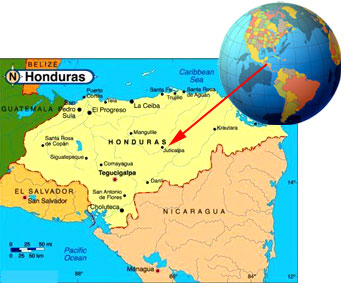Honduras President overthown in military coup
By Thelma Mejía | Last updated: Jun 29, 2009 - 11:12:12 AMWhat's your opinion on this article?

|
Congress, which decided late Thursday to investigate whether the president was fit to govern on the grounds that he "failed to pay due attention to problems of national interest and did not obey legal decisions, to the detriment of the rule of law," planned to meet at noon (18:00 GMT) to complete the process.
The head of Congress, Roberto Micheletti, will be named acting president, as Zelaya's constitutional successor.
General elections are due in Honduras in November, and Zelaya's term ends in January.
Blackout
There is virtually no power or Internet in the Honduran capital in the wake of the coup d'etat. Electricity was gradually cut throughout the city, which is being overflown by war planes and helicopters. The few media outlets that continue to broadcast are only airing music.
The police have reportedly fired tear gas to disperse the growing crowds that have taken to the streets to protest.
There is also a blackout in some neighborhoods in San Pedro Sula, the second largest city in this Central American nation.
The Organization of American States (OAS) has convened an emergency meeting on the situation, at its headquarters in Washington, D.C.
In a statement, OAS Secretary General José Miguel Insulza strongly condemned the military coup and called on the Honduran people, the countries of the Americas and the international community "to join forces against this grave disturbance of the democratic process" in the region.
Officials in the White House reported that Obama and National Security Adviser James Jones met early Sunday to discuss the situation in Honduras.
Zelaya's plans to hold a non-binding popular referendum Sunday asking voters whether or not to hold a formal vote in November on creating a constituent assembly to rewrite the constitution put him at loggerheads with the Supreme Court, the military and Congress, including members of his own party, the Liberal Party.
The situation deteriorated quickly over the last few days.
On Wednesday the president dismissed the military chief, General Romeo Vásquez and accepted the resignation of Defense Minister Edmundo Orellana after the armed forces commanders refused to help organize the referendum by distributing ballot boxes and providing security.
The Supreme Court ruled that the referendum was illegal, and voted to reinstate Vásquez. But Zelaya refused to accept the military chief's reinstatement, and went ahead with the distribution of voting materials.
The opposition maintains that Zelaya's aim was to change the constitution to allow presidents to run for re-election.
Sunday's unofficial referendum was deemed illegal on the argument that it violates the constitutional stipulation that referendums cannot be held during an election year.
The European Union has called on the Honduran military to release Zelaya and restore constitutional order. "The EU strongly condemns the arrest of the constitutional president of the republic of Honduras by the armed forces," Foreign Minister Jan Kohout of the Czech Republic, which holds the rotating EU presidency, told reporters in Corfu, Greece.
"This action is an unacceptable violation of constitutional order in Honduras," said Kohout. "The EU calls for the urgent release of the president and a swift return to constitutional normality."
Zelaya was elected as the candidate of the centrist Liberal Party, but soon after taking office he took a turn to the left.
INSIDE STORIES AND REVIEWS
-
-
About Harriett ... and the Negro Hollywood Road Show
By Rabiah Muhammad, Guest Columnist » Full Story -
Skepticism greets Jay-Z, NFL talk of inspiring change
By Bryan 18X Crawford and Richard B. Muhammad The Final Call Newspaper @TheFinalCall » Full Story -
The painful problem of Black girls and suicide
By Charlene Muhammad -National Correspondent- » Full Story -
Exploitation of Innocence - Report: Perceptions, policies hurting Black girls
By Charlene Muhammad -National Correspondent- » Full Story -
Big Ballin: Big ideas fuel a father’s Big Baller Brand and brash business sense
By Bryan Crawford -Contributing Writer- » Full Story






 Click Here Stay Connected!
Click Here Stay Connected!








